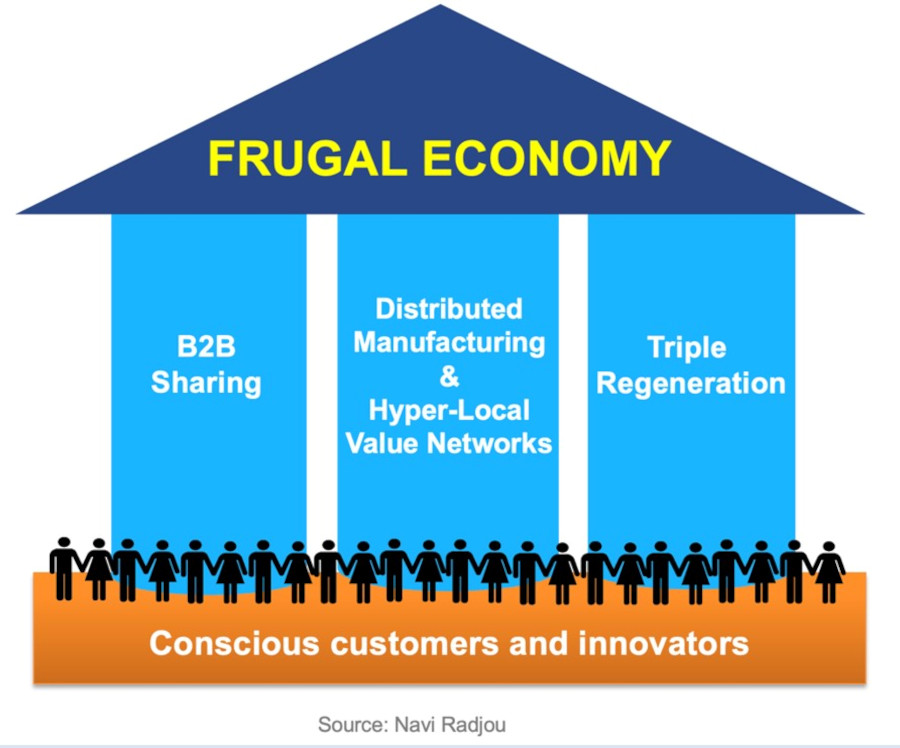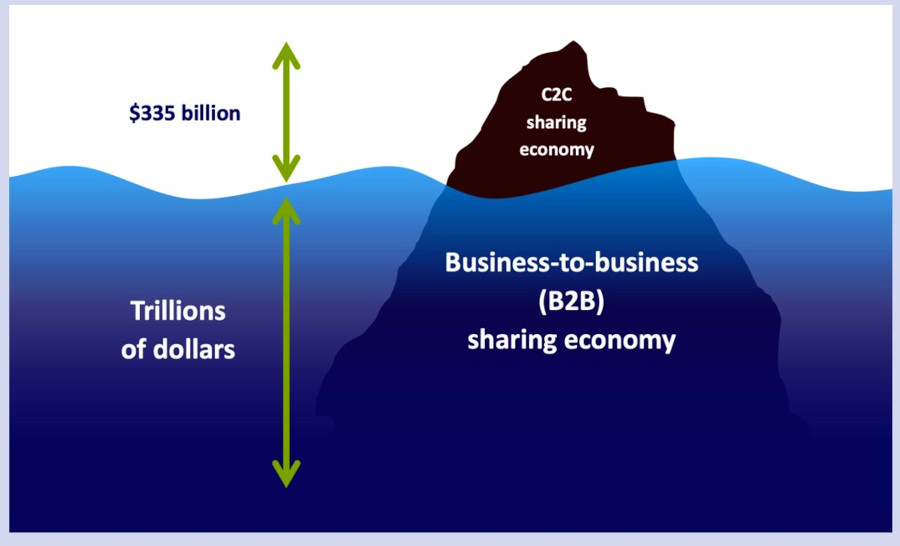Developing a better world with a lot much less
Our dysfunctional and wasteful capitalist financial system desires an enormous overhaul
to become socially inclusive and ecologically virtuous. Sadly, most proposed
strategies for ‘fixing’ capitalism — along with a spherical
financial system,
stakeholder
capitalism,
ESG,
decarbonization
— whereas well-intended, have restricted success in mainly shifting the mindset
of corporations, reshaping cross-company interactions, and restructuring complete
commerce value chains.
To efficiently deal with the triple urgency — exploding social inequalities,
worsening native climate
change,
and rising helpful useful resource
scarcity
— going via our societies, we’ll’t depend upon degree choices to restore our financial system. To
use a tech analogy: These degree choices are good apps — nonetheless they run on a
clunky, resource-intensive working system.
A brand-new working system — which I title a “frugal financial system” — is urgently
needed to assemble and preserve revolutionary new enterprise fashions and transformative
industrial value networks which are literally useful for society, along with the
setting.
A frugal financial system contributes to human enchancment and creates further monetary,
social and ecological value synergistically, whereas optimizing the utilization of all
obtainable belongings. The frugal financial system makes use of ingenious strategies to “do larger with
a lot much less” by maximizing the value for all stakeholders using minimal belongings —
in distinction to capitalism, which seeks to ‘do further with further’ by gobbling up
ever further belongings to create value for a select few.
A frugal financial system addresses the desires and aspirations of thrifty and socially
acutely conscious prospects who search simpler, extra wholesome and eco-friendly existence and
try and deepen their group ties via energetic native involvement.
Nonetheless this frugal financial system is not any utopia. Drawing on better than 100 real-life
examples from world large, my upcoming
e-book
chronicles the rise of the multitrillion-dollar frugal financial system, powered by
three megatrends that will deeply reshape our societies throughout the subsequent a few years:
-
business-to-business (B2B) sharing
-
distributed (decentralized) manufacturing and hyper-local value
networks, and -
triple regeneration.
The three core qualities stimulated in a frugal financial system — sharing,
distributing and regenerating — are diametrically in opposition to the three
flaws of a capitalist financial system acknowledged for hoarding (property and revenue),
centralizing (operations), and depleting (nature and communities).
On this sequence of 4 articles, I will have a look at these three megatrends — which
kind the three pillars of the frugal financial system — and current their transformative
have an effect on on corporations, industries, communities and the setting.

Share each little factor, waste nothing
Digital platforms along with Uber, Airbnb, BlaBlaCar and SpotHero
already permit tens of tens of millions of individuals to share their underused autos, properties and
parking space with others — thus, incomes additional income whereas boosting the
value and usefulness of their property. In accordance with PwC, this peer-to-peer or
consumer-to-consumer (C2C) sharing
financial system
is poised to develop from $15 billion in 2015 to a whopping $335 billion by
2025.
We don’t affiliate “sharing” with the enterprise world, the place companies compete
ferociously and amass and hoard belongings. However, progressive companies are starting
to share their bodily and intangible belongings with one another — subsequently,
maximizing the value of their property and decreasing waste. In doing so, these
vanguards are giving rise to the business-to-business (B2B) sharing
market
— which can very effectively be worth trillions of {{dollars}}, dwarfing the C2C sharing
financial system.[^1]
 B2B sharing might dwarf the C2C sharing financial system in amount and price. | Image
B2B sharing might dwarf the C2C sharing financial system in amount and price. | Image
credit score rating: Navi Radjou
B2B sharing boosts effectivity, agility, innovation, curbs waste
Let’s have a look at the large enterprise benefits of B2B sharing. By sharing belongings,
enterprise can:
Cut back capital expenditure
As an alternative of dropping invaluable capital to assemble new factories and warehouses,
producers can shortly and affordably improve their present chain
capabilities by utilizing on-demand industrial marketplaces equal to,
Fictiv, Protolabs
Neighborhood and Xometry.
These digital platforms nearly be a part of plenty of of extraordinarily specialised
machine retailers with world companies, which helps small companies hold in full
manufacturing — notably all through recessions or pandemics.
Cut back working costs
As an alternative of committing to a dear long-term lease, corporations can get additional
office space on demand from workplace sharing suppliers equal to
Deskpass and
LiquidSpace. Having versatile office space
satisfies freedom-seeking staff who have to have the power to work from
wherever. Likewise, hospitals throughout the US, Canada and the
Netherlands depend upon Floow2 and
Rheaply platforms to share their underused medical
gear, provides and suppliers — thus, holding these property completely used,
lowering working payments and bettering affected individual care.
Make additional revenue (and save the planet)
Inside the US, heavy-duty autos signify 25 p.c of all greenhouse gas
emissions
from transportation — a sector that accounts for nearly 30 p.c of all
emissions throughout the nation. However, the autos on US roads run empty as a lot as 35
p.c of the
time
as drivers can’t uncover satisfactory shipments to fill their autos. These
“empty miles” signify tens of tens of tens of millions of tons of CO2 yearly.
AI-based freight networks equal to Convoy,
Sennder, Trella,
TruggHub and
Vahak be a part of shippers with
carriers to maximise truck fill fees by aggregating quite a lot of shipments into
a single exercise for a driver — decreasing freight worth for shippers, creating
further revenue for truck operators and significantly decreasing emissions
related to empty miles.
Although the world’s excessive companies spent a whopping €1.3 trillion ($1.42
trillion) in R&D in
2022
alone, solely 5 p.c of all patented
improvements
are effectively commercialized or licensed — which suggests, psychological
property (IP) worth plenty of of billions of {{dollars}} goes to waste each
12 months. Thankfully, on-line brokering suppliers equal to
NineSigma and
yet2.com permit companies to raised monetize and make
further income from their unexploited IP equal to patents by licensing them to
innovation-seeking corporations.
Enhance agility and resilience
When purchaser demand plummets on account of recessions, pandemics and totally different
disruptive events, small corporations are caught with underemployed workforces.
Experience-sharing platforms along with Hydres,
Hyver and
Teambix permit companies to short-term “lend”
underused workers to totally different corporations on the lookout for additional human belongings. These
digital platforms moreover ease the expert mobility of workers who wish to
go away their current employers to pursue a career elsewhere.
In March 2020, as COVID-19 swept over France,
Kolmi-Hopen — the nation’s biggest
producer of face masks — was urged to increase masks manufacturing at its
manufacturing unit near Angers, but it surely lacked the obligatory in-house expertise
to take motion. It used an employee-sharing
platform
to promptly decide and borrow consultants in industrial processes from
Scania — a heavy-vehicle producer shut by.
Due to this experience sharing, Kolmi-Hopen was ready to shortly reconfigure
its manufacturing processes and double its masks manufacturing in doc time.
Innovate sooner, larger, cheaper
95 p.c of newest shopper merchandise
fail
correct after they hit the market, on account of they don’t fulfill precise purchaser
desires. The top outcome? Producers are caught with expensive unsold inventory. Moderately
than speculate on what prospects want and mass-produce the incorrect merchandise
sooner, producers might use retail-space-sharing platforms equal to Appear
Proper right here and The
Storefront to determine pop-up retailers in
quite a lot of key locations. In these short-term micro-retail web sites, producers can
check out an enormous variety of new product concepts with prospects and gather their
options. Producers can then selectively ramp up manufacturing of those concepts
that prospects extraordinarily favor — subsequently, launching maximum-viable merchandise
that yield larger income and fewer waste.
As these examples show, by sharing bodily belongings (gear,
providers, autos) and intangible property (staff, IP), corporations can
do larger with a lot much less — boosting revenue, agility and innovation functionality
whereas slashing working costs and waste.
Major social, ecological benefits
Previous turbocharging companies’ monetary effectivity, B2B sharing may even
generate constructive societal value — notably in underdeveloped communities
— for quite a lot of causes.
First, B2B sharing networks and platforms catalyze new employment
alternate options whereas moreover safeguarding native jobs and vital expertise in
regional economies. For example, industrial symbiosis
(IS)
is a system whereby quite a lot of shut by companies companion to share provides,
waste and energy in a mutually useful method. IS duties (equal to
FE21 in northeastern France, NISP throughout the
UK and
Canada,
WISP in South
Africa, and Washington State’s Industrial
Symbiosis program lease plenty of of individuals, sometimes from marginalized groups, to
recycle their waste — revitalizing native communities every economically and
socially.
Second, B2B sharing permits artisans, small farmers and SMEs — among the many
most important and at-risk players in our financial system — to bolster their
resilience, flexibility and effectivity by accessing belongings and
expertise from totally different corporations at diminished worth. As an illustration, in
Africa, Howdy Tractor capabilities as an “Uber
for small farmers” — offering them entry to tractors and farm gear
with pay-per-use decisions. This cost-effective, custom-made tractor-rental
service permits financially struggling African farmers to do larger with
a lot much less: They are going to plant 40 events quicker and a pair of.5 events further
affordably
with a tractor than manually, resulting in 63 p.c monetary financial savings and a triple
improvement in crop yield.
Third, B2B sharing can enhance the wellbeing of all residents. Tired of
drug shortages and price gouging from the pharmaceutical commerce, 55 effectively being
methods representing over 1,550 US hospitals acquired right here collectively in 2018 to create
Civica
Rx — a
nonprofit guaranteeing cheap, reliable drug present all through the US. Civica
swimming swimming pools the purchasing for vitality of its 55 members to strike a long-term address
specialty pharmaceutical companies equal to Xellia and generic drugmakers
along with Hikma to manufacture over 80 important medicine throughout the US at a
fixed and equitable
value,
and assure uninterrupted present for a number of years. Civica’s frugal medicine
have been used to cope with over 60 million victims throughout the US; the company is
now establishing its private manufacturing
facility
in Petersburg, Virginia to produce insulin in large amount and slash its
worth from $300 to $30 per vial.
B2B sharing might also considerably revenue the setting. If all
companies might merely share their waste and recycle it collectively — a
pillar of the spherical financial system — we might decrease world greenhouse emissions
by nearly 40
p.c.
If companies have been to moreover share their underused bodily property — inventory,
machines, buildings, autos — the ecological benefits might very effectively be humongous.
For example, B2B carpooling and ride-sharing suppliers along with BlaBlaCar
On daily basis, OpenFleet,
Free2move and
Socar will assist corporations drastically shrink
their vehicle fleet measurement, current versatile and cost-effective transportation
decisions for staff, and massively curtail their carbon emissions.
Broadminded companies are boldly sharing their sustainability-focused
proprietary utilized sciences even with rivals to boost the environmental
effectivity of complete industries. For example, Unilever’s R&D teams
developed “compressed
deodorants”
that require 25 p.c a lot much less aluminum and half the propellant — resulting in
a 25 p.c decrease throughout the carbon footprint of each aerosol. Unilever’s
scientists moreover reformulated its ice cream
in order that they hold safe at a warmer freezer
temperature.
Likewise, Levi Strauss invented 20 strategies to chop again the water used
all through denim
ending
by as a lot as 96 p.c. As quickly as these two companies efficiently carried out these
changes inside their very personal present chains, they made the improvements open provide
to reinforce the overall environmental have an effect on of their commerce.
Progressive initiatives leverage the power of B2B sharing to generate
concurrently further monetary, social and ecological value that revenue every
corporations and underserved communities. As an illustration, on-line market Picture voltaic
Stewards permits
companies to purchase photograph voltaic energy straight from historically excluded
communities the place they do enterprise. The company aggregates modest photograph voltaic duties
organize at native faculties, universities, parishes and townhalls into portfolios of
scale that enchantment to firm patrons of recent energy. Holistic B2B sharing
packages equal to Picture voltaic Stewards’ can foster an equitable energy transition in
each of the three,143
counties
all through the US.
In capitalist methods, companies function with a scarcity mentality and compete
aggressively in a zero-sum sport dominated by the elements 1 + 1 = 0. As we enter
proper right into a
VUCA
world, however, corporations ought to stay away from rivalry and be taught to cooperate. As Indians
say “ek aur ek gyarah,” — which suggests, 1 + 1 equals
11.
By sharing bodily and immaterial belongings, companies can co-create far
larger monetary, social and ecological value than they’re going to on their very personal. B2B
sharing is a core pillar of a frugal financial system that will help assemble inclusive and
sustainable societies throughout the twenty first century.
Be taught further in regards to the frugal financial system:
[^1]: B2B transactions – whether or not or not offline or on-line – are lots larger in amount and price than B2C transactions. In accordance with Statista, the worldwide B2B e-commerce market was valued at $17.9 trillion in 2021 — better than 5 events larger than the B2C market.



